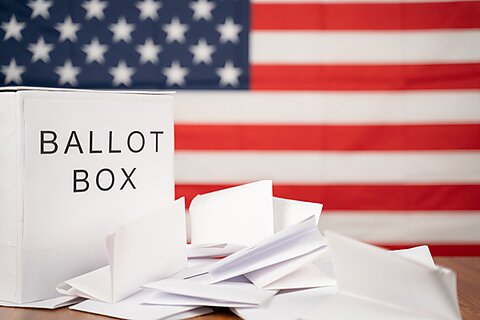Following elections in which former President Donald Trump denounced alternate voting methods as fraud‐ridden and encouraged Republicans to save their votes for Election Day, both Trump and the Republican Party now generally have shifted gears to encourage GOP campaigns and voters to use the full gamut of alternate balloting methods, from vote by mail through early in‐person voting to the use of drop boxes. That’s mostly welcome news — but with one bipartisan exception that merits continued scrutiny.
The shift by itself isn’t likely to alter election outcomes much, since the adoption of alternate voting methods probably has only minor effects at most on partisan results. While Democrats are heavier users of in‐person early voting, for instance, it’s mostly a method used by persons who would have cast votes anyway. What exceptions there may be are not always predictable: it’s been argued, for example, that severe Election Day weather in 2022 in Nevada worked to the disadvantage of Republicans, who were relying on Election Day turnout.
A more systematic benefit is that campaigns can save money and target their resources more effectively if supporters vote early. If a household is already recorded in the state database two weeks before Election Day as having voted, there’s no need to bombard it with last‐minute mailings and phone calls.
There is also reason to believe that mail and drop box voting appeals to many constituencies among whom Republicans tend to do well, such as retirees and homemaking moms. In fact, until Trump chose to impose a different narrative, Republicans in many states were thought to be more skillful users of mail voting.
Partisan interest aside, there are two ways in which the interest of the nation as a whole is likely to be well served by the GOP’s return to course on this point. First, it abets distrust, polarization, and gamesmanship for one voting method to be seen as somehow “belonging to” one side. If early in‐person voting is no longer perceived as a Democratic specialty, it will be easier for states to weigh impartially how much of it to schedule (from election administrators’ perspective, there are potential burdens in providing either too little or too much of it). Likewise for other methods.
The second ground for renewed optimism is that allowing voters to sort themselves more evenly between ballot channels will tend to dissipate the “red mirage” phenomenon in which one party jumps off to an early lead based on an early counting of votes that were cast its favored way, only to see that lead diminish and reverse as votes from the other party’s favored channels get counted.
It is hard to exaggerate how much damage the “red mirage” did in setting up the conditions for much of the public to be misled about the 2020 presidential election.
Two‐and‐a‐half cheers, then, for the news. I withhold a full third cheer because news reports suggest (albeit sometimes ambiguously) that many Republicans also intend to adopt paid ballot collection (“ballot harvesting”) in states where it is legal, presumably sending out paid operatives to collect ballots by the hundred and drop them off (perhaps after bringing them back to headquarters for a while).
But as I’ve argued, third‐party ballot collection poses real dangers to voter privacy, security, and freedom from improper pressure, especially when there is no feasible way to keep collectors from seeing how a ballot was marked or even helping the voter mark it. Convenience in voting is decidedly a good thing — but not so good as to be worth a wholesale sacrifice of the secret ballot.

